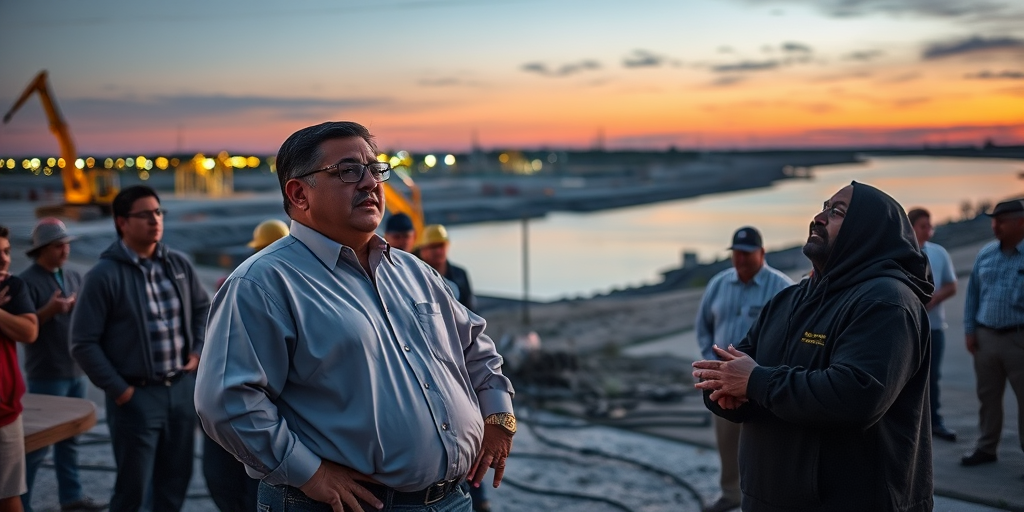**Hidalgo County Commissioner Highlights Progress in Delta Area Water Project**
A significant boost to water resource management is on the horizon for the Rio Grande Valley (RGV) as the Hidalgo County Precinct 1 Commissioner, David Fuentes, provides updates on the ongoing Delta Area Water Management Project. This initiative aims to enhance water treatment and availability through the construction of four reservoirs and corresponding treatment plants. With a target to provide up to 5 million gallons of treated water daily, this project is a critical development for Valley residents confronting water scarcity issues.
Project Overview and Recent Developments
The Delta Area Water Management Project is designed as a strategic solution to treat and supply potable water to communities within Hidalgo County, particularly vital in a region prone to drought and fluctuating water availability. Commissioner Fuentes recently announced that the State of Texas has allocated an additional $15 million to this undertaking, further strengthening efforts to meet its $70 million funding requirement for the construction of the first treatment plant.
Critical approval from the Texas Commission on Environmental Quality (TCEQ) has also been secured, ensuring the project’s plans comply with state water quality and safety standards. “This is a major milestone for us,” Fuentes stated, emphasizing the importance of TCEQ’s endorsement.
Significance of Senate Bill 1967
Recent legislative advancements through Senate Bill 1967 significantly impact the project’s funding landscape. Now, the county can apply for additional grants aimed at bolstering resources for the water project, which already boasts $45 million in funding. “Realistically, it’ll take three to four years before we start seeing water come out, but at least that clock has started,” Fuentes added, highlighting the practical timeline for the project’s first stage.
Local Impact and Context
For Valley residents, access to a reliable and increased water supply could transform daily life significantly. The region’s history of droughts and water rationing makes this project not just beneficial but necessary for sustainable development. The reservoirs are strategically planned in flood-prone areas to capture and store rainwater, reducing surface runoff and potential flood damage during episodes of severe weather—a known issue in the cities of Edcouch, Elsa, and La Villa, which experienced intense flooding during the March 2025 storms.
Moreover, Fuentes noted that while the first treatment plant will come online in a few years, the project is designed for scalability, with each reservoir able to provide a consistent water output once the network is fully operational.
Previous and Ongoing Water Challenges
Historically, the RGV has faced obstacles with water management due to its geographic location and reliance on the Rio Grande for a significant part of its water supply. Periodic droughts have highlighted the need for alternative water sources and better water infrastructure. The advancement of the Delta Area Water Management Project can mitigate this age-old challenge, ensuring future water security for residential and municipal use.
Future Prospects and Challenges
While the project promises numerous benefits, certain challenges persist. Environmental advocates have underlined the importance of maintaining ecological balance during construction and operation phases. Any project impacting natural watercourses or the region’s unique ecosystems must consider potential environmental trade-offs.
Furthermore, ensuring that water from these newly treated sources meets all safety standards, and conducting ongoing monitoring remain pivotal concerns. Commissioner Fuentes clarified that the water would potentially undergo a double purification process in coordination with county and city facilities to meet stringent safety criteria.
Community Engagement and Resources
As this effort progresses, county officials are encouraging public participation and transparency. Residents can stay informed and involved through community meetings and updates. For those seeking more direct engagement or having specific questions, contact information for the commissioner’s office is available, providing a channel for public feedback and concerns.
In conclusion, the Delta Area Water Management Project represents a forward-thinking response to long-standing challenges faced by the RGV. As work continues, it stands as a testament to collaborative efforts and strategic investment in the region’s future. With support from both public officials and the community, the project is poised to significantly improve the standard of living and ensure a stable water supply for generations to come.







